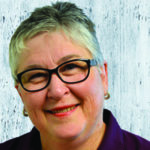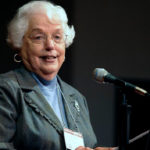Carolyn Porterfield has served as the interim executive director-treasurer of the Women’s Missionary Union of Texas since October 2016. She has been the WMU’s missional lifestyle strategist for adults and multicultural groups since May 2009. From deep in the heart of one Texan, she shares her background and thoughts on church and ministry. To suggest a Baptist General Convention of Texas-affiliated leader to be featured in this column, or to apply to be featured yourself, click here.
Background
Where else have you worked, and what were your positions?
- Missionary Journeyman in Kyoto, Japan; ESL teacher
- Baptist Women Consultant with Arkansas Baptist State Convention
- Baptist Young Women Consultant; WMU, SBC in Birmingham, Ala.
- With WMU of Texas, I have served in these positions: associate executive director, executive director-treasurer, MSL for adults and multicultural groups, interim executive director-treasurer
Where did you grow up?
Grand Junction, Colo.
How did you come to faith in Christ?
I am a product of Southern Baptist missions efforts. Growing up in western Colorado, there weren’t many Baptists, let alone Southern Baptists. But Southern Baptists’ missions vision led to new churches and a state convention in which I grew up. I heard the word of God preached and taught. At the age of nine, I knew that I was lost and needed a Savior. A big part of my faith journey was also the realization that God loved me, but he also loved all the peoples of the earth. Not all knew, and I could have a part in telling them.
Where were you educated, and what degrees did you receive?
My undergraduate degree is from Wayland Baptist University. My master’s is from Southwestern Baptist Theological Seminary.
Ministry/Profession
Why do you feel called to your particular vocation?
Sign up for our weekly edition and get all our headlines in your inbox on Thursdays
Through missions discipleship, God planted a love for the nations in my heart. My first cross-cultural experience was working at the Home Mission Board-funded “Spanish mission” in my hometown as a teen.
During college, I was a summer missionary in Richmond, Virginia, working in an African American church. For the first time in my life, I was the minority.
After graduation, it was on to Japan and a place where people had literally never heard the gospel or knew the name of Jesus. John 3:16 became so real to me there. I deeply desired to go back overseas, but God had others plans.
At an IMB commissioning service in 1989, God very clearly spoke to me that I was to keep doing what I was doing as a missions mobilizer — to create awareness, help others go, be a missions pray-er and invite others to be engaged in God’s mission.
Please tell us about your BGCT institution—the breadth and nature of its work, including its mission, measures of scope, etc.
WMU of Texas believes in the restoration of brokenness through hope in Jesus Christ. We make disciples who make disciples. Working with all ages, we pour into each generation the biblical principles that equip the church to fulfill the Great Commission of going into all the world to preach the good news, make disciples, baptize them and teach them to obey all that Christ taught.
Our work is built around these missions concepts: praying, learning, doing, supporting and developing spiritually toward a missions lifestyle.
This is one example of how I have seen these expressed. For the past six years, we have built a house for a family living in poverty in Penitas, Texas. As we put our faith in action, we have seen families grow and thrive. Earlier this year, we sat in the home of Maria Luisa Morales, whose home we built in 2016. Their family was on the verge of breaking apart. God used a team of 20 women to make a difference in the life of her family. She looked around the room and at her four children and said, “Look what Jesus did in one year.” We are only instruments in his great missions plan for all peoples. We will build our seventh house in October.
What do you like best about leading your institution? Why?
What I like the most is making disciples who make disciples. When you stay somewhere as long as I have, you see the impact of your ministry through the lives of those with whom you work. I have poured into women and now see them taking what they have learned and pouring into others. That makes my heart sing.
What aspect(s) of your institution and/or its mission do you wish more people understood?
They why of WMU remains firmly intact. We do what we do because of what we believe. Every person on the planet should hear the gospel and have an opportunity to respond to it.
We wish churches would realize that the how and what of missions discipleship has changed. Just because something has a long history doesn’t mean it is irrelevant or obsolete.
How has your institution and its mission changed since you began your career?
In short, I would say these are some of the changes I have seen over 30 years of ministry.
Churches are choosing a variety of ways to be engaged in missions, some through traditional denominational channels and others outside those channels. More churches have become the sending body for missionaries versus people being sent though a specific sending agency.
One mission offering has replaced three separate mission offerings, but too often the prayer and learning components are lost.
Missions discipleship has been replaced with other options for all ages. There is no “one size fits all.” It is both challenging and exciting to work with churches who are willing to create what works for them.
The growth of ethnic churches in Texas reflects the state’s population. I love working with these churches because they are so engaged in reaching people both here and in their home countries.
How do you expect your institution and/or its mission to change in the next 10 to 20 years?
I don’t see our why changing because it is from God’s heart and laid out clearly in his word.
What I do see changing is how we will go about our work and what we do in the future. Those conversations are happening even as I write this. The focus will be more significantly around the doing/going aspects of what we are about plus developing spiritually toward a missions lifestyle.
What one aspect of your job gives you the greatest joy or fulfillment?
I love working with women in ethnic churches because I see the breadth and depth of the love of God and experience the reality that he is drawing all peoples to himself.
My work has helped me understand more clearly what Christ intends his kingdom to be. How I wish all Christ followers would understand and live out the role God has given the church to “declare his glory among all nations, his marvelous deeds among all peoples” (Psalm 96:3).
The nations are in our neighborhoods. I hear God saying, “Don’t be afraid. Go and tell.”
About Baptists
What would you change about the Baptist denomination—state, nation or local?
We live in a desperately broken world. I long for the day when we will live as forgiven people and come together to be a true representation of our Savior. We aren’t perfect people in our theology or practice, but we are forgiven. We are the recipients of what we don’t deserve, and God has withheld from us what we do deserve. Let’s share his mercy and grace with others.
About Carolyn
Who were/are your mentors, and how did/do they influence you?
- George Ray, Jr. helped me clarify God’s call in my life and was a strong encourager to me as a teenager.
- Tommy Bridges at SWBTS saw something in me I couldn’t see and opened a door for ministry that has been meaningful and fulfilling. He was a mentor to me before I even knew the term or understood its importance.
- There are too many women to name, but I have been inspired by those who have followed Jesus faithfully in spite of what the culture or the church told them they could or could not do.
- Julie Ketner took a chance on a young, inexperienced woman and patiently helped me develop as a leader.
- Martha Dewbre Ryan helped me grow up and modeled for me a lifestyle of being on mission every day.
- WMU of Texas leaders like Joy Fenner, Amelia Bishop, Jeane Law, Gerry Dunkin, Mary Humphries, Kathy Hillman and so many more have shown me that women have important work to do in God’s kingdom and each God-given skill and ability uniquely suits them for their leadership season.
Other than the Bible, name some of your favorite books or authors, and explain why.
Favorite authors related to cross-cultural ministry are Duane Elmer and David Livermore. Livermore’s work on cultural intelligence would help any Texas Baptist who seeks to reach our state for Christ. I am challenged by Eugene Peterson’s book, A Long Obedience in the Same Direction.
Who is your favorite Bible character, other than Jesus? Why?
For years I didn’t particularly care for Paul’s attitude until I camped out on 1 Timothy 1:12–17. He knew what he had been. He knew what Jesus had and was doing in his life. He was sold out in every way so Jew and Gentile alike could hear the gospel. He endured suffering gladly for the sake of Christ. Yes, he had the credibility to say, “Be like me.”
Name something about you that would surprise people who know you well.
I love to sing. As a student at WBU, I was in a BSM singing group that traveled all over Eastern New Mexico and West Texas. We even got to sing on a cruise ship in 1976 as onboard entertainment and were privileged to visit Greece, Egypt, Turkey and Israel.
If you could get one “do over” in your career, what would it be, and why?
I would take better care of my own soul. Long years ago, I heard someone say that we can starve to death ourselves while feeding others from a full cup. It is right and good for any one in ministry to care well for their own soul.














We seek to connect God’s story and God’s people around the world. To learn more about God’s story, click here.
Send comments and feedback to Eric Black, our editor. For comments to be published, please specify “letter to the editor.” Maximum length for publication is 300 words.